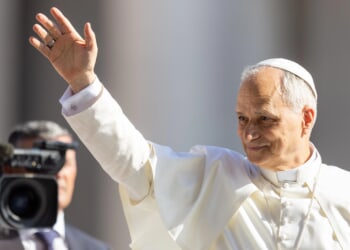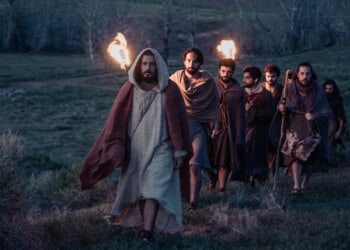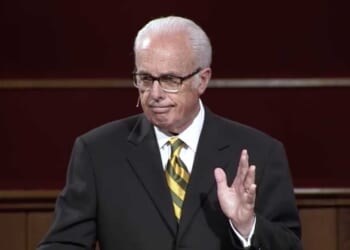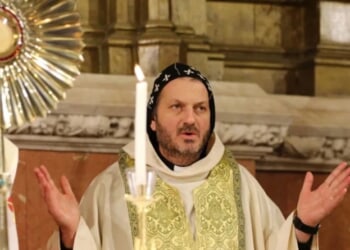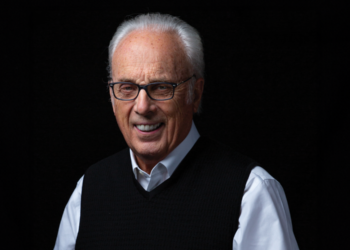Washington, D.C. Newsroom, Jul 21, 2025 /
19:05 pm
Less than 70 years after Charles Darwin published “On the Origin of Species,” the small town of Dayton, Tennessee, became the center of the American debate about human evolution, the interpretation of Genesis, and broader sentiments about Christianity.
On July 21, 1925 — a century ago today — substitute teacher John T. Scopes was found guilty of violating a state ban on teaching evolution in schools. His $100 fine (equal to $1,837 today) was overturned by the Tennessee Supreme Court. Both then and today, the widely publicized trial has been portrayed as a microcosm of an asserted battle between “science” and “religion.”
Scopes was defended by American Civil Liberties Union (ACLU) lawyer Clarence Darrow, who was religiously agnostic. William Jennings Bryan, a Protestant Christian and three-time Democratic Party nominee for president, defended the state law and a literalist understanding of the first few chapters of Genesis.
During the trial, Darrow called Bryan to the stand as a Bible expert and proceeded to grill him on certain texts of the Bible and question their historical accuracy. That line of questioning allowed Darrow to use the trial as a proxy fight against Christianity itself. Although that portion of the trial was thrown out by the judge because it was not relevant to Scopes’ charges, it is remembered for its impact on 20th-century debates about human evolution and Christianity.
Most famously, the 1955 play and 1960 film “Inherit the Wind” played up the “science vs. religion” narrative, effectively solidifying that perception in American culture.
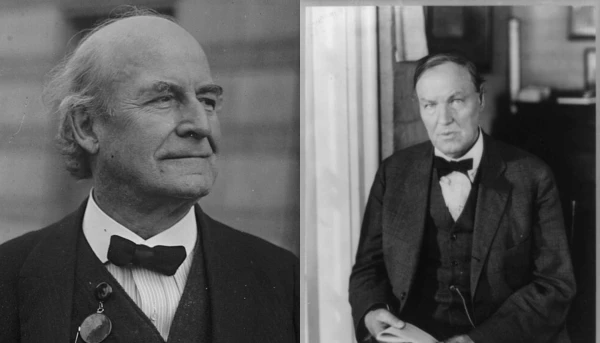
The reality of the conflict at the time, however, was much more nuanced than “science” against “religion.”
Dominican Father Thomas Davenport, a physicist and philosopher at the Pontifical University of St. Thomas Aquinas in Rome, told CNA it would be “wrong” to suggest that Catholicism was on the side against evolutionary thought during the trial.
“The trial was … more of a crisis and a conflict involving American Protestants than Catholics, in part because of a broader philosophical, theological, and scriptural traditions that Catholics have to draw on to understand God’s revelation and the natural world, and to put them in harmony,” said Davenport, who co-authored the book “Thomistic Evolution.”
Kenneth Kemp, a retired philosophy professor for the University of St. Thomas in Minnesota, told CNA: “The trial is too often used by anti-religious polemicists as support for their idea that the relation between science and religion is fundamentally conflictual.”
Kemp, who authored two books on evolution and Christianity — “The War That Never Was” and “The Origins of Catholic Evolutionism” — said it’s important to learn “how easily history can be distorted in the service of ideology.”
“The ‘wars’ underlying the Scopes trial were in fact not between science and religion but rather one war between evolutionists and anti-evolutionists, with Christians on both sides, and another war between militant atheists and Christians, with evolutionists on both sides,” he said.
The Catholic Church and evolution
Catholic scholars considered the possibility of human evolution since the middle of the 19th century, around the time Darwin posited his theory, according to Kemp. In a lecture that he delivered at the Thomistic Institute, he said there were three distinct positions by the tail end of the 1800s.
One position, he pointed out, was that bodily evolution was simply a myth. The second position was that the human body evolved from an ape-like ancestor but that the human soul is directly created by God. A third position between the two suggested that an ape-like ancestor evolved toward a preparatory stage but that the final stage of the human body was formed by a direct act of God.
Some books promoting the second view were placed on the Vatican’s list of prohibited books in the 1890s, but the Church avoided making any proclamations on evolution at the time. The First Vatican Council in 1870 avoided the subject despite the widespread public discourse.
(Story continues below)
Subscribe to our daily newsletter
At the time of the Scopes trial in the 1920s, Kemp noted in the lecture, American Catholics “generally kept their distance from both sides of the controversy.”

In his lecture, Kemp cited a 1925 article in America magazine that said one side “wishes to establish Protestant fundamentalism as a state religion” while the other “aims at no less than an overturn of all of Christianity.” A 1925 Commonweal article characterized the trial as “the stirring up of a raucous and heated debate between … emotional extremists,” referring to the lawyers on both sides.
The Vatican issued a proclamation on the matter 25 years after the Scopes trial when Pope Pius XII published the encyclical Humani Generis. The pontiff stated that human bodily evolution was a permissible belief, as long as one accepts that God directly creates the human soul and all humans descend from Adam and Eve. It does not require that a Catholic believe in evolution.
About 62% of self-identified Catholic Americans believe in evolution today, according to a 2024 Gallup survey. This is higher than the broader American population, of which 58% believe in the theory.
Much of the theological debate surrounded the text of the beginning of Genesis, but Davenport told CNA that Catholics should be careful about assuming that the passages “are relating a simple historical chronology” but rather should “try to understand what the literary genre and intent of the text was.”
According to Davenport, one lesson a person should take from the Scriptures about the origin of man is that the creation of human beings was “very good” and a “special part of the created order.” Another is that humans are “partly like the bodily animal world, but partly separate from it.” A third is that humans “were not predetermined to sin, but we fell through our own fault.”
Daniel Kuebler, a biology professor at Franciscan University, told CNA that the Church recognizes there is a “material component” to humans but that the process by which that comes about “is something that the Church has not made definitive proclamations on,” which permits a belief in human evolution.
Some of the opposition to evolutionary thought, according to Kuebler, stems from the belief that evolution would suggest “man is just a material being.” Yet, he said that claim “goes far beyond what science can demonstrate.”
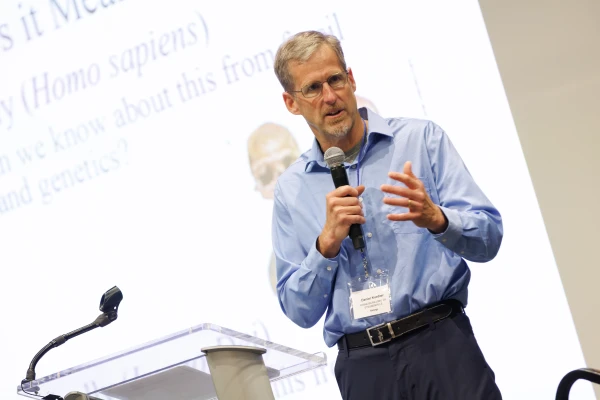
Kuebler argued that evolution on its own “can’t explain the totality of man” and noted that the Church clearly teaches that humans have “a spiritual component: a soul that does not evolve.”
Opposition to human evolution today
A century after the Scopes trial, a belief in evolution has increased among Catholics and the broader public. Yet some organizations, such as The Kolbe Center for the Study of Creation, oppose the concept of human evolution and continue to argue in favor of six-day creationism and the position that God created humans in their current form.
Hugh Owen, the founder and director of the Kolbe Center — a Catholic nonprofit — told CNA that his organization is faithful to Pius XII’s declaration on evolution, because the pontiff urged the faithful to consider the evidence for and against evolution. Owen said the Kolbe Center ensures the lay faithful have an “opportunity to look at both sides,” which he warned many young Catholics do not encounter.
Owen argued that Church tradition and the early Church Fathers are “completely on the side of six-day creation.” He said he believes it’s important to defend this position because “an error about creation is always reflected in an error about God” and that “the character of God is at stake.”
There were some Church Fathers, however, who did not believe in a strict six-day creation, such as St. Augustine of Hippo. Owen argued Augustine did not have access to a proper translation of Genesis.
Owen acknowledged that many Catholic intellectuals at the time of the Scopes trial believed in human evolution. Yet, he pointed to some of the evidence that was used before and during the trial that has since been proven fraudulent or inaccurate.
For example, two fossils that were believed to show an intermediary between early humans and modern man — Piltdown Man and Nebraska Man — were later disproven. Some organs that were believed to have lost their original function through evolution, he pointed out, were later found to have a current function.
Owen also pointed to the discredited embryonic recapitulation theory, which suggested that embryonic development went through various stages that resembled ancestral species.
“It’s been a gradual process, but there’s no doubt that already at the time of the Scopes trial, many Catholic intellectuals had already been deceived into thinking that bogus evidence … really did [prove human evolution],” Owen said.
Kuebler, alternatively, told CNA there are two main pieces of evidence that lead biologists to overwhelmingly believe that humans evolved from an ape-like ancestor. One is “a whole host of intermediary fossils that are not quite human” and fossil records that show “an increase in brain size over time and upright posture.” The other is “the genetic evidence” showing a similarity with chimps.




